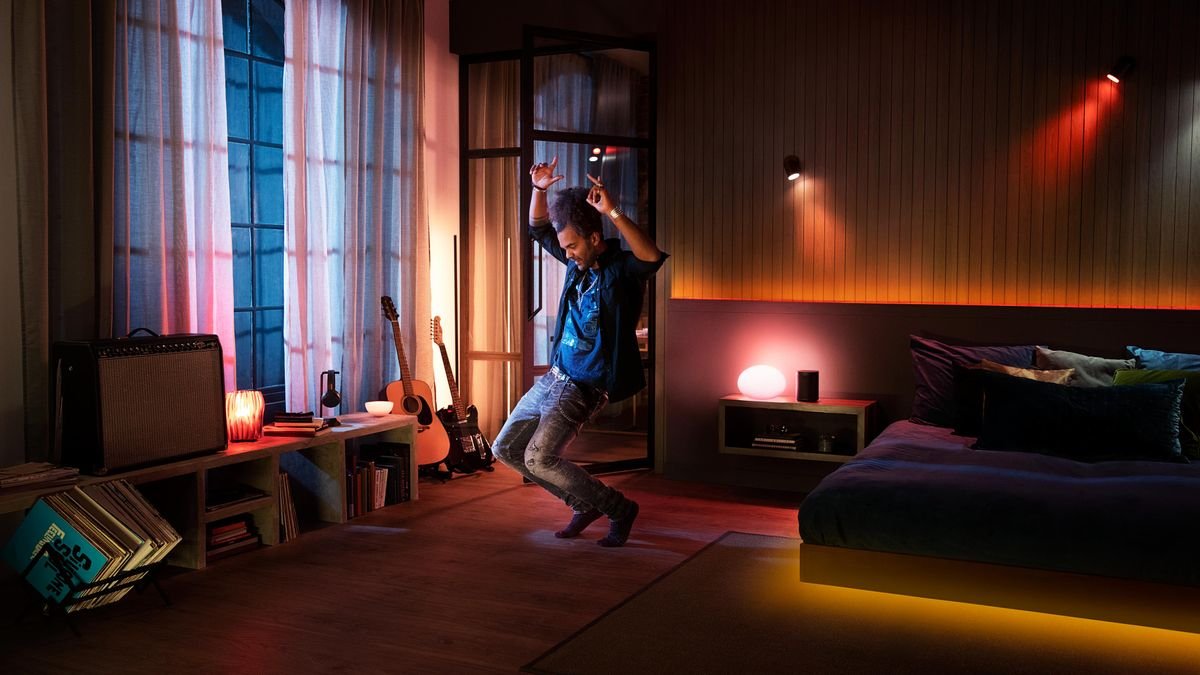
At CES 2025 in Las Vegas, Signify (the company behind Philips Hue) announced that the Hue ecosystem will soon have its own generative AI assistant to make lighting your home easier.
Details are quite scant so far, but we know that it will be possible to control the tool using typed or spoken commands, and that it will create “personalized lighting scenes based on mood, occasion, or style.” You’ll also be able to give feedback to help improve the assistant’s output in the future.
There’s no word on exactly when the assistant will be released, but late last month, the editor of fan site Hueblog.com noticed that the usual magnifying glass icon in the Hue app’s search box had been replaced by the cluster of stars that typically represent AI features.
The launch could happen at any time, but what exactly will it bring? Will it just focus on changing the colors of your lights, or will it change how you use your whole Philips Hue system?
As someone with a complete set of Hue lights at home, I’m intrigued to see what’s coming, and I’ve got a wish list of things I’d love to see when the assistant eventually lands.
1. No subscription fee
This might be too much to ask, considering the time and cost of developing and running AI tools. Even so, Philips Hue products are already among the most expensive smart lights on the market, and adding an extra subscription fee for AI features might put off some potential customers – even if those tools are optional.
The backlash against the AI-powered Garmin Connect+ subscription demonstrates how angry customers can become if new features are locked behind a paywall after paying for the hardware.
I won’t hold my breath. After all, the Philips Hue ecosystem already has various subscription options for those who want extra features, including Philips Hue Secure for security cameras and an optional monthly fee for the Philips Hue Sync app on LG and Samsung smart TVs (as an alternative to a one-off payment).
The fact that the default search icon changed to an ‘AI’ symbol without any payment being made gives me hope that it will be available free to everyone. However, a free AI assistant might be very limited in scope, so i’m a little torn about this.

2. More than moods
The Philips Hue ecosystem includes some of the best smart lights around, and they can do a lot more than just create mood lighting. So, it would be great if the upcoming AI assistant could capitalize on that.
For example, if you could tell the assistant “I’m going away for a week”, it might enable a seven-day ‘mimic presence’ automation that switches lights on in different rooms throughout the day to create the impression that someone is home.
A more sophisticated assistant might also be able to create a full morning routine that gradually wakes you by increasing the brightness of your lights and an evening routine that dims them (and changes the colors to sunset tones) after dark and turns off your smart plugs and switches, all without tinkering with settings manually.
3. Compatibility with cameras and more
Signify says that the upcoming AI assistant will be able to control your lights, but it would be even better if it also worked with other Hue devices. After all, the ecosystem includes some of the best smart switches and best home security cameras, so it makes sense to incorporate these.
If the assistant worked with devices other than lights, you could also use it to arm and disarm your security devices. For example, telling it, “I’m going to work,” might arm your security system and turn off all lights until you’re due home (or it senses that you’re back).

4. Simple search
A few weeks ago, Ring announced a new feature for subscribers: the ability to search their video recordings for specific events using AI. The Smart Video Search function lets you find a specific moment using natural language. Just type your request into the app (such as ‘show me when the package was delivered’ or ‘show me the deliver driver in the brown uniform’), and the tool will find and display that snippet of footage.
If you already have a Philips Hue Secure subscription, something similar would be a great addition that would save you time scrubbing through footage to find out when something happened.
5. Energy-saving suggestions
The fourth-generation Nest Learning Thermostat monitors how you heat and cool your house and uses AI to suggest changes that you could make to reduce your energy consumption – so why not something similar for your lights and devices connected to Philips Hue smart plugs?
Granted, lights use much less energy than an HVAC system, but it would still be nice if your bulbs, sensors, and cameras worked together to determine optimal times to turn off your lights to conserve a little power.
It’s even possible that one day your Philips Hue light bulbs may be able to act as presence sensors, so you wouldn’t even need any extra devices to determine whether you’re in the room, or you’ve left and it’s fine to switch off the lights.


